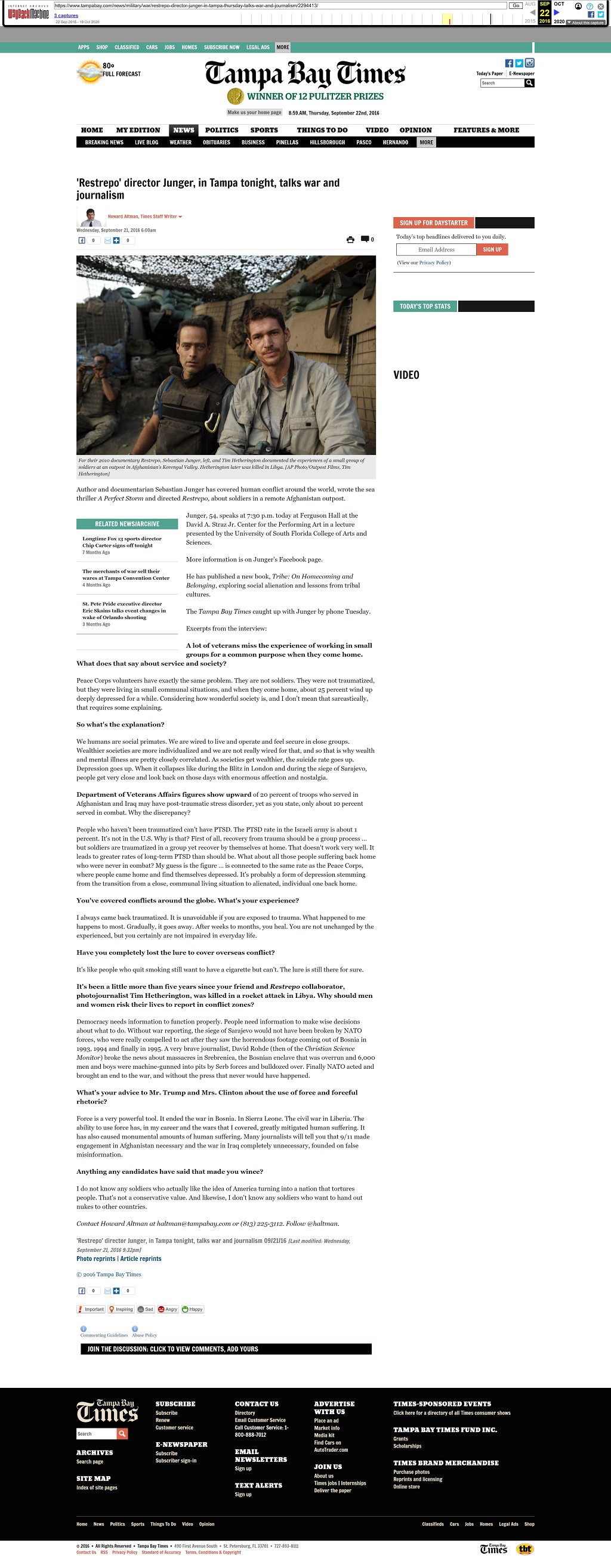
News / Military
By Howard Altman / Tampa Bay Times / September 21, 2016
PHOTO: For their 2010 documentary Restrepo, Sebastian Junger, left, and Tim Hetherington documented the experiences of a small group of soldiers at an outpost in Afghanistan’s Korengal Valley. Hetherington later was killed in Libya. (AP Photo/Outpost Films, Tim Hetherington)
Author and documentarian Sebastian Junger has covered human conflict around the world, wrote the sea thriller A Perfect Storm and directed Restrepo, about soldiers in a remote Afghanistan outpost.
Junger, 54, speaks at 7:30 p.m. today at Ferguson Hall at the David A. Straz Jr. Center for the Performing Art in a lecture presented by the University of South Florida College of Arts and Sciences.
More information is on Junger’s Facebook page.
He has published a new book, Tribe: On Homecoming and Belonging, exploring social alienation and lessons from tribal cultures.
The Tampa Bay Times caught up with Junger by phone Tuesday.
Excerpts from the interview:
A lot of veterans miss the experience of working in small groups for a common purpose when they come home. What does that say about service and society?
Peace Corps volunteers have exactly the same problem. They are not soldiers. They were not traumatized, but they were living in small communal situations, and when they come home, about 25 percent wind up deeply depressed for a while. Considering how wonderful society is, and I don’t mean that sarcastically, that requires some explaining.
So what’s the explanation?
We humans are social primates. We are wired to live and operate and feel secure in close groups. Wealthier societies are more individualized and we are not really wired for that, and so that is why wealth and mental illness are pretty closely correlated. As societies get wealthier, the suicide rate goes up. Depression goes up. When it collapses like during the Blitz in London and during the siege of Sarajevo, people get very close and look back on those days with enormous affection and nostalgia.
Department of Veterans Affairs figures show upward of 20 percent of troops who served in Afghanistan and Iraq may have post-traumatic stress disorder, yet as you state, only about 10 percent served in combat. Why the discrepancy?
People who haven’t been traumatized can’t have PTSD. The PTSD rate in the Israeli army is about 1 percent. It’s not in the U.S. Why is that? First of all, recovery from trauma should be a group process … but soldiers are traumatized in a group yet recover by themselves at home. That doesn’t work very well. It leads to greater rates of long-term PTSD than should be. What about all those people suffering back home who were never in combat? My guess is the figure … is connected to the same rate as the Peace Corps, where people came home and find themselves depressed. It’s probably a form of depression stemming from the transition from a close, communal living situation to alienated, individual one back home.
You’ve covered conflicts around the globe. What’s your experience?
I always came back traumatized. It is unavoidable if you are exposed to trauma. What happened to me happens to most. Gradually, it goes away. After weeks to months, you heal. You are not unchanged by the experienced, but you certainly are not impaired in everyday life.
Have you completely lost the lure to cover overseas conflict?
It’s like people who quit smoking still want to have a cigarette but can’t. The lure is still there for sure.
It’s been a little more than five years since your friend and Restrepo collaborator, photojournalist Tim Hetherington, was killed in a rocket attack in Libya. Why should men and women risk their lives to report in conflict zones?
Democracy needs information to function properly. People need information to make wise decisions about what to do. Without war reporting, the siege of Sarajevo would not have been broken by NATO forces, who were really compelled to act after they saw the horrendous footage coming out of Bosnia in 1993, 1994 and finally in 1995. A very brave journalist, David Rohde (then of the Christian Science Monitor) broke the news about massacres in Srebrenica, the Bosnian enclave that was overrun and 6,000 men and boys were machine-gunned into pits by Serb forces and bulldozed over. Finally NATO acted and brought an end to the war, and without the press that never would have happened.
What’s your advice to Mr. Trump and Mrs. Clinton about the use of force and forceful rhetoric?
Force is a very powerful tool. It ended the war in Bosnia. In Sierra Leone. The civil war in Liberia. The ability to use force has, in my career and the wars that I covered, greatly mitigated human suffering. It has also caused monumental amounts of human suffering. Many journalists will tell you that 9/11 made engagement in Afghanistan necessary and the war in Iraq completely unnecessary, founded on false misinformation.
Anything any candidates have said that made you wince?
I do not know any soldiers who actually like the idea of America turning into a nation that tortures people. That’s not a conservative value. And likewise, I don’t know any soldiers who want to hand out nukes to other countries.
Wayback image

